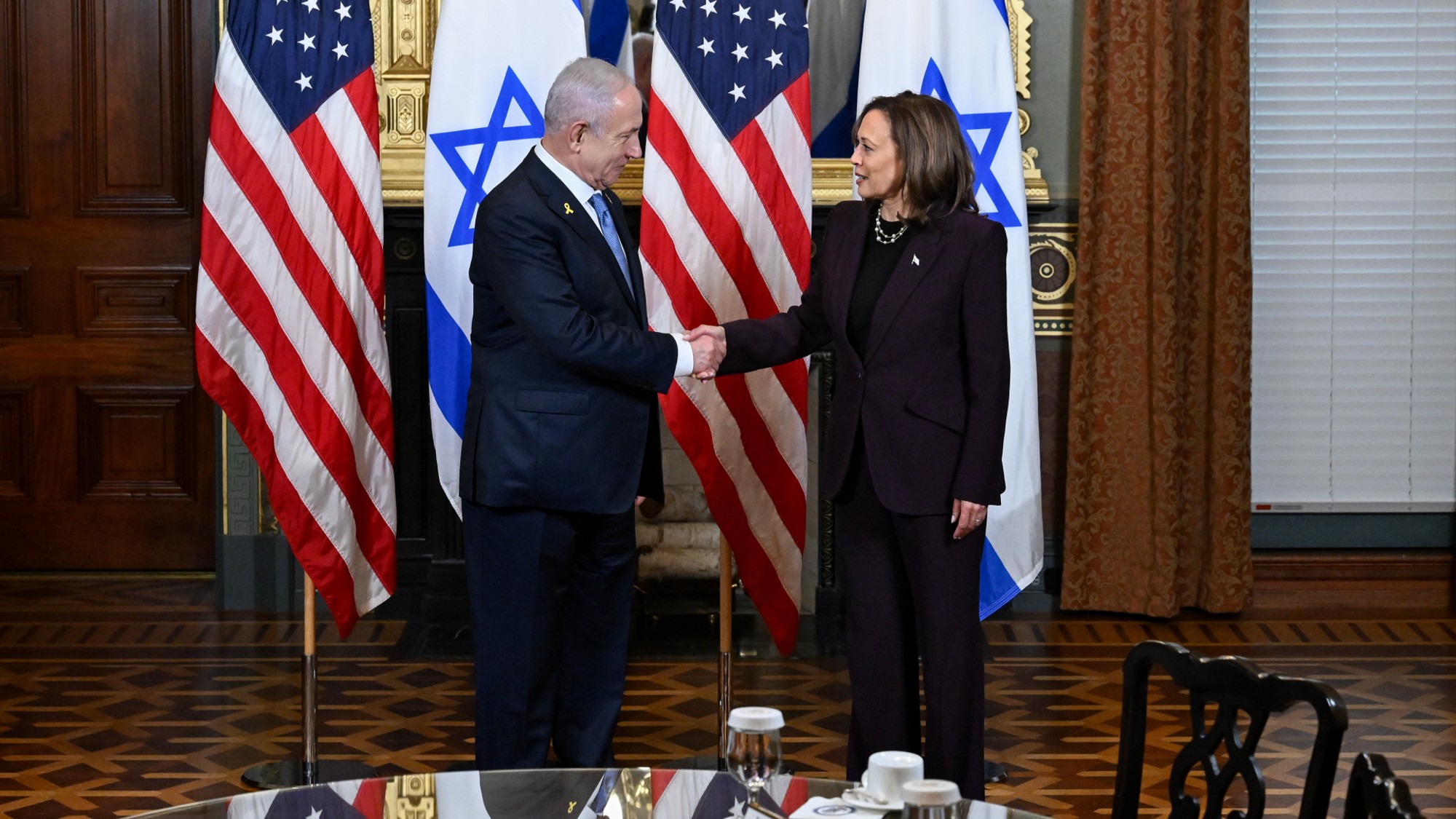Kamala Harris' foreign policy a 'mix of might and right'
How she would approach America's relationships in the world


A free daily email with the biggest news stories of the day – and the best features from TheWeek.com
You are now subscribed
Your newsletter sign-up was successful
Kamala Harris "would pursue an evolution rather than a revolution" in America's relationships in the world if she becomes president, Josh Rogin said at The Washington Post. Vice presidents don't make foreign policy — they help implement a president's vision. That has been Harris' role under President Joe Biden for the last four years. Now, though, she's preparing to outline a foreign policy agenda that offers "both continuity with the Biden administration and modulation where his policy has fallen short."
Harris has signaled that her candidacy offers a "chance to reset" a Middle East policy that has alienated progressive Democrats, said NBC News. "Israel has a right to defend itself," she said after a meeting last month with Prime Minister Benjamin Netanyahu. But, Harris added: "We cannot allow ourselves to become numb to the suffering" of Palestinians. That's a sign that her foreign policy views differ "more on tone than on substance" from Biden's approach.
'Stress-tested' on the world stage
"She doesn't really have a background in defense or foreign policy," one former official told Politico. And she certainly doesn't have nearly as much experience as Biden, who has been deeply involved in America's foreign policy as senator, vice president and president over the last 50 years. But she has acted as a "surrogate" for Biden on the world stage — including at a 2022 security summit where she voiced support for Ukraine ahead of Russia's invasion. "Frankly," said Rep. Adam Smith (D-Wash.), "she has been stress-tested."
The Week
Escape your echo chamber. Get the facts behind the news, plus analysis from multiple perspectives.

Sign up for The Week's Free Newsletters
From our morning news briefing to a weekly Good News Newsletter, get the best of The Week delivered directly to your inbox.
From our morning news briefing to a weekly Good News Newsletter, get the best of The Week delivered directly to your inbox.
Harris has been "more involved in foreign policy than we realize," Fred Kaplan said at Slate. As vice president, she has visited 21 countries and met with more than 150 leaders. Some of those trips "amounted to rote protocol." There were also substantive accomplishments: Smoothing over relationships with France amidst anger over an American nuclear submarine deal with Australia, and helping bring the Philippines back into America's orbit in the Pacific. "She's not a foreign-policy wonk," said Eurasia Group's Ian Bremmer, "but there's no question she has played an active role on a bunch of foreign-policy issues."
Harris and Trump: 'Strategically consistent'
The elephant in the room: China. "Does China prefer Harris or Trump?," asked Wang Jisi, Hu Ran and Zhao Jianwei at Foreign Affairs. Donald Trump's presidency saw "a far more confrontational approach" to Beijing, and Biden's policies have followed along much the same lines, reflecting a bipartisan consensus that China "must now be treated as a major adversary." Trump would probably pursue a "more aggressive trade policy," but he might also be more inclined toward deal-making. A Harris approach to China would probably be "more organized and predictable." From China's perspective, though, the differences are mainly stylistic. Otherwise, on China, Trump and Harris are "strategically consistent."
Harris' "life experience" is one of the best guides to predicting her foreign policy, Anne-Marie Slaughter said at the Financial Times. Her background as a prosecutor gives Harris a "steeliness" toward foes like Russia as well as a "focus on victims as well as perpetrators." This makes her likely to base her foreign policy on a notion of "peace through strength" in which strength flows from American values. "Call it a new mix of might and right."
A free daily email with the biggest news stories of the day – and the best features from TheWeek.com
Joel Mathis is a writer with 30 years of newspaper and online journalism experience. His work also regularly appears in National Geographic and The Kansas City Star. His awards include best online commentary at the Online News Association and (twice) at the City and Regional Magazine Association.
-
 Local elections 2026: where are they and who is expected to win?
Local elections 2026: where are they and who is expected to win?The Explainer Labour is braced for heavy losses and U-turn on postponing some council elections hasn’t helped the party’s prospects
-
 6 of the world’s most accessible destinations
6 of the world’s most accessible destinationsThe Week Recommends Experience all of Berlin, Singapore and Sydney
-
 How the FCC’s ‘equal time’ rule works
How the FCC’s ‘equal time’ rule worksIn the Spotlight The law is at the heart of the Colbert-CBS conflict
-
 ‘The mark’s significance is psychological, if that’
‘The mark’s significance is psychological, if that’Instant Opinion Opinion, comment and editorials of the day
-
 Big-time money squabbles: the conflict over California’s proposed billionaire tax
Big-time money squabbles: the conflict over California’s proposed billionaire taxTalking Points Californians worth more than $1.1 billion would pay a one-time 5% tax
-
 Did Alex Pretti’s killing open a GOP rift on guns?
Did Alex Pretti’s killing open a GOP rift on guns?Talking Points Second Amendment groups push back on the White House narrative
-
 Washington grapples with ICE’s growing footprint — and future
Washington grapples with ICE’s growing footprint — and futureTALKING POINTS The deadly provocations of federal officers in Minnesota have put ICE back in the national spotlight
-
 Trump’s Greenland ambitions push NATO to the edge
Trump’s Greenland ambitions push NATO to the edgeTalking Points The military alliance is facing its worst-ever crisis
-
 Why is Trump threatening defense firms?
Why is Trump threatening defense firms?Talking Points CEO pay and stock buybacks will be restricted
-
 A running list of the international figures Donald Trump has pardoned
A running list of the international figures Donald Trump has pardonedin depth The president has grown bolder in flexing executive clemency powers beyond national borders
-
 A running list of US interventions in Latin America and the Caribbean after World War II
A running list of US interventions in Latin America and the Caribbean after World War IIin depth Nicolás Maduro isn’t the first regional leader to be toppled directly or indirectly by the US
